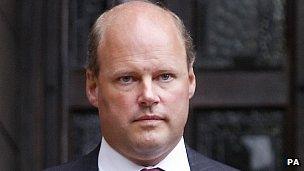Government and Labour clash over RBS chief's bonus
- Published

Mr Hester was appointed after RBS was bailed out by the taxpayer
Ministers and Labour have clashed over the terms of RBS chief Stephen Hester's contract, and how much influence the government has over his bonus.
Ministers said they stuck to a contract agreed by the last Labour government which "determined" bonus arrangements.
Labour said that was "nonsense" and say the Royal Bank of Scotland (RBS) board had discretion over payments.
The bank, which is 82% owned by the taxpayer, has offered Mr Hester share options currently worth £963,000.
The award has sparked anger across the political spectrum with one Lib Dem minister calling for Mr Hester to waive the payment and Conservative Mayor of London Boris Johnson urging the government to "step in".
Labour Leader Ed Miliband has accused the prime minister of a "disgraceful failure of leadership" over the issue.
No 10 has said the proper processes were followed and it was up to Mr Hester to decide whether to accept the bonus - which is not payable for three years when the final amount will be determined by the firm's share price.
'Process'
Ministers have suggested their hands were largely tied by the terms of the contract agreed by the RBS board - and approved by the last Labour government - when Mr Hester joined the bank in 2009, shortly after it was bailed out by the government.
"The arrangements for paying the bonus were determined by the contracts he signed with the previous government," Chancellor George Osborne said.
"They were determined by the board of RBS under the arrangements set up by the previous government."
Mr Osborne suggested the alternative, for the government to take over complete ownership of RBS and to over-rule the board, would ultimately have cost the taxpayer more.
No 10 said the contract agreed in 2009 meant Mr Hester was entitled to be considered for a bonus.
"That process was established by the previous government and that process is reflected in a bonus which is less than half the bonus Stephen Hester was paid last year," Downing Street said.
"The public sector shareholder has taken a keen interest in this and has had an influence on it."
And Deputy Prime Minister Nick Clegg said ministers had "stuck to the contract signed by the previous Labour government" and approved by UK Financial Investments - the arms-length body which manages the taxpayer's 82% stake.
'Non-binding'
But Labour said the RBS board had the freedom to determine bonuses every year.
"The deputy prime minister somehow insinuated this bonus results from a framework put in place by the last Labour government," shadow business secretary Chuka Umunna said.
"This is complete and utter nonsense and has been confirmed by RBS because we know now that the bonuses are agreed every year on a rolling annual basis."
And Lord Myners, who was City minister under Labour when Mr Hester was appointed, said: "There is nothing in the employment contract of Stephen Hester which binds the company or its remuneration committee to pay a mandatory bonus".
The BBC's chief economics correspondent Hugh Pym said the fact Mr Hester's bonus was only 60% of the full amount to which he was entitled, demonstrated that there was some discretion in the process.
He said ministers were concerned that if they pressured the board to block the bonus entirely, they would walk out and destabilise efforts to restore RBS to financial health.
Several City and business analysts have said Mr Hester is entitled to receive a bonus for his performance while Conservative MP Mark Field said Mr Hester should not be "vilified" as he was responsible for managing £45bn of public money.
- Published27 January 2012
- Published27 January 2012